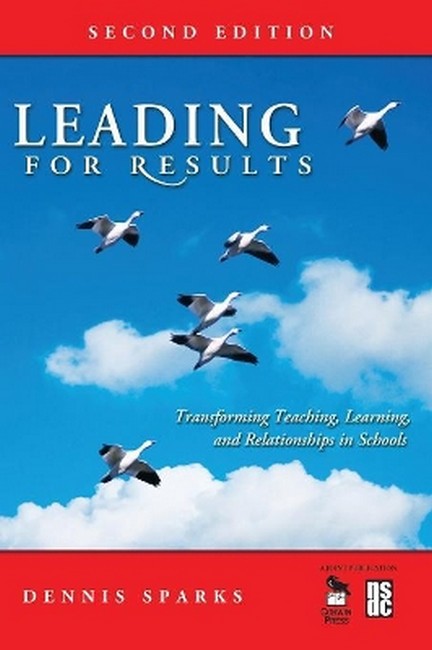Dennis Sparks has been executive director of the 10,000-member National Staff Development Council since 1984. He previously was an independent educational consultant and director of the Northwest Staff Development Center. Sparks has been a teacher, counselor, and co-director of an alternative high school. He completed his doctorate in counseling at the University of Michigan in 1976, and has taught at several universities. He speaks frequently throughout North America on topics such as powerful staff development and effective teaching. Sparks has authored Designing Powerful Professional Development for Teachers and Principals (NSDC, 2002) and Conversations that Matter (NSDC, 2001), a collection of his JSD interviews since 1991. He is co-author with Stephanie Hirsh of Learning to Lead, Leading to Learn (NSDC, 2000) and A New Vision for Staff Development (ASCD/NSDC, 1997). He also co-authored, with Joan Richardson, What is Staff Development Anyway? (NSDC, 1998). Sparks' column appears each month NSDC's newsletter, Results. His interviews with leading educational thinkers also appear in NSDC'sJournal of Staff Development. In addition, his articles have appeared in a variety of publications, including Educational Leadership, Phi Delta Kappan, The American School Board Journal, The Principal, and The School Administrator. Sparks' interviews and articles are accessible on the NSDC web site at www.nsdc.org/library/authors/sparks.cfm.
Request Academic Copy
Please copy the ISBN for submitting review copy form
Description
Acknowledgments About the Author Introduction How to Use This Book Part I: Transformation Through Clarity and Creation 1. Use Fundamental Choices to Create Your Life 2. Clarify Your Intentions 3. Establish Stretch Goals 4. Identify Multiple Ways to Achieve Your Goals 5. Find the Trim Tab 6. The 80/20 Principle 7. Practice Satisficing 8. Determine Root Causes 9. Develop a Theory of Action and Use Storytelling to Communicate It 10. Gain ClarityThrough Writing, Speaking, and Reflecting on Action 11. Leaders Provide Teachable Points of View Part II: Transformation Through Interpersonal Influence 12. Tell Your Truth 13. Use Candor to Assess Current Reality 14. Use Genuine Dialogue 15. Engage in Dialogue-Like Conversations 16. Listen to Others in a Deep, Committed Way 17. Use Silence as a Learning Tool 18. Make Requests to Initiate Action and Create Results 19. Make and Keep Promises 20. Replace Questions With Declarative Statements 21. Minimize the Language of Obligation 22. Decrease the Use of Cause-Effect Language 23. Stand Up for Your Point of View Part III: Transformation Through a Culture That Promotes Professional Learning, Teamwork, and Continuous Improvement 24. Shape School Culture to Improve Teaching and Sustain Competent Teaching 25. Create Successful Schools 26. Promote Breakthrough Thinking 27. Attend to Leaders' Inner Development 28. Recognize Our Best Selves 29. Increase the Use of Signature Strengths 30. Enhance Your Personal Energy 31. Build Relationships to Sustain Positive Energy 32. Address the Fundamental Barriers to Professional Learning and Teamwork in Schools 33. Spread Positive Emotions Throughout the Organization 34. Address Anxiety in the Schoolhouse 35. Appeal to the Heart as Well as the Head Part IV: Transformation Through Professional Learning and Doing 36. Design Powerful Professional Learning for All Educators 37. Match Professional Development Goals and Methods With Student Outcomes 38. Bridge the Knowing-Doing Gap 39. Amplify Positive Deviance 40. Create Professional Learning That Alters Educators' Brains 41. Install Next Action Thinking 42. Change Habits 43. Sustain the Conversation Index
"Sparks has distilled his vision of leadership into this helpful guide. This is a personal look at leadership, not as much about what leaders should do (although a large number of how-to's are included), but more about how leaders should think and feel to actualize their potential and unleash individual and organizational energy." -- The School Administrator, May 2007

